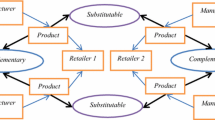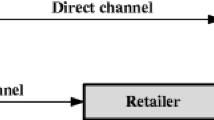Abstract
This paper considers tripartite pricing issues in a two-echelon supply chain involving duopolistic manufacturers and a single retailer. Firstly, a tripartite competitive model is conducted, in which both a Stackelberg game and a Bertrand game occur simultaneously. It is shown that the manufacturer who possesses a higher sales quantity gains more profits than the other one. Secondly, a definition of optimal vertical pricing alliance is proposed when cooperation exists between the retailer and some manufacturer. We conduct two-player games when partial cooperation exists among the three participants. It is demonstrated that the total profit of the alliance is higher than the sum profit of the corresponding two participants in the tripartite competition model, and meanwhile the profit of the manufacturer who is not in the alliance suffers a loss. Further, a criterion is given to judge which manufacturer the retailer will choose to cooperate in order to maximize the total increased profits. From the perspective of game theory, we examine the stability of the vertical alliance with considering the dominance of the retailer. Finally, a numerical illustration is designed to examine the judging criteria of which manufacturer is the member of the optimal alliance under different potential market demands.
Similar content being viewed by others
References
Basiri Z, Heydari J (2017). A mathematical model for green supply chain coordination with substitutable products. Journal of Cleaner Production 145: 232–249.
Ceryan O (2019). Asymmetric pricing and replenishment controls for substitutable products. Decision Sciences 50(5): 1093–1119.
Ceryan O, Sahin O, Duenyas I (2013). Dynamic pricing of substitutable products in the presence of capacity flexibility. Manufacturing & Service Operations Management 15(1): 86–101.
Chen M, Chen Z.L (2017). Dynamic pricing of substitutable products in the presence of capacity flexibility. Manufacturing & Service Operations Management 20(2): 249–268.
Hosseini-Motlagh S M, Nematollahi M, Johari M (2018). A collaborative model for coordination of monopolistic manufacturer’s promotional efforts and competing duopolistic retailers’ trade credits. International Journal of Production Economics 204: 108–122.
Karakul M, Chan L (2008). Analytical and managerial implications of integrating product substitutability in the joint pricing and procurement problem. European Journal of Operational Research 190: 179–204.
Kuang Y, Ng C T (2018). Pricing substitutable products under consumer regrets. International Journal of Production Economics 203: 286–300.
Li H, You T (2012). Capacity commitment and pricing for substitutable products under competition. Journal of Systems Science and Systems Engineering 21(4): 443–460.
Li J, Wang Y, Luo X, Zhou W (2019). Make or buy in the presence of strategic competition on substitutable products. Journal of Systems Science and Systems Engineering 28(1): 657–673.
Lou Z, Hou F, Lou X (2020). Optimal ordering and pricing models of a two-echelon supply chain under multiple times ordering. Journal of Industrial and Management Optimization, doi:https://doi.org/10.3934/jimo.2020109.
Lou Z, Lou X, Dai X (2020). Game-theoretic models of green products in a two-echelon dual-channel supply chain under government subsidies. Mathematical Problems in Engineering 2020: 2425401.
Ma P, Zhang C, Hong X, Xu H (2018). Pricing decisions for substitutable products with green manufacturing in a competitive supply chain. Journal of Cleaner Production 183: 618–640.
Nagarajan M, Rajagopalan S (2008). Inventory models for substitutable products: optimal policies and heuristics. Management Science 54(8): 1453–1466.
Nagarajan M, Sosic G (2008). Game-theoretic analysis of cooperation among supply chain agents: Review and extensions. European Journal of Operational Research 187(3): 719–745.
Sosic G (2010). Stability of information-sharing alliances in a three-level supply chain. Naval Research Logistics 57(3): 279–295.
Suh M, Aydin G (2011). Dynamic pricing of substitutable products with limited inventories under logit demand. IIE Transactions 43(5): 323–331.
Taleizadeh A.A, Akhavizadegan F, Ansarifar J (2019). Pricing and quality level decisions of substitutable products in online and traditional selling channels: Game-theoretical approaches. International Transactions in Operational Research 26(5): 1718–1751.
Taleizadeh A.A, Soleymanfar V.R, Choi T.M (2017). Optimal pricing and alliance strategy in a retailer-led supply chain with the return policy: A game-theoretic analysis. Information Sciences 420: 466–489.
Tang C.S, Yin R (2007). Joint ordering and pricing strategies for managing substitutable products. Production and Operations Management 16(1): 138–153.
Vetter H (2017). Pricing and market conduct in a vertical relationship. Journal of Economics 121: 239–253.
Wang L, Song H, Wang Y (2017). Pricing and service decisions of complementary products in a dual-channel supply chain. Computers & Industrial Engineering 105: 223–233.
Zhang D, Cooper W.L (2009). Pricing substitutable flights in airline revenue management. European Journal of Operational Research 197: 848–861.
Zhao J, Wei J, Li Y (2017). Pricing and remanufacturing decisions for two substitutable products with a common retailer. Journal of Industrial and Management Optimization 13(2): 1125–1147.
Zhou Y, Cao Z, Zhong Y (2015). Pricing and alliance selection for a dominant retailer with an upstream entry. European Journal of Operational Research 243(1): 211–223.
Acknowledgments
We would like to thank the editors and reviewers for their constructive suggestions and corrections to enhance the clarity of the present article.
Author information
Authors and Affiliations
Corresponding author
Additional information
Zhenkai Lou is a doctoral candidate of management science in School of Management and Economics, Beijing Institute of Technology, China. His research interests include decision theory and supply chain management.
Fujun Hou received his Ph.D. degree in School of Management and Economics from Beijing Institute of Technology, China. He is currently a professor in Beijing Institute of Technology. His research interests include group decision and supply chain management. He has published more than 30 papers in technical journals.
Xuming Lou received his Ph.D. degree in the School of Management, Xi’an Jiaotong University, China. He is currently a professor in School of Economics and Management, Xi’an University of Posts and Telecommunications, China. His research interests include decision theory and enterprise operation management.
Tingting Ma received her Ph.D. degree in School of Management and Economics, Beijing Institute of Technology, China. She is currently an associate professor in Beijing Wuzi University. Her research interests include technological innovation and opportunity identification.
Rights and permissions
About this article
Cite this article
Lou, Z., Hou, F., Lou, X. et al. Game-theoretical Models of a Two-echelon Supply Chain Involving Two Substitutable Products. J. Syst. Sci. Syst. Eng. 30, 307–320 (2021). https://doi.org/10.1007/s11518-021-5483-7
Published:
Issue Date:
DOI: https://doi.org/10.1007/s11518-021-5483-7




